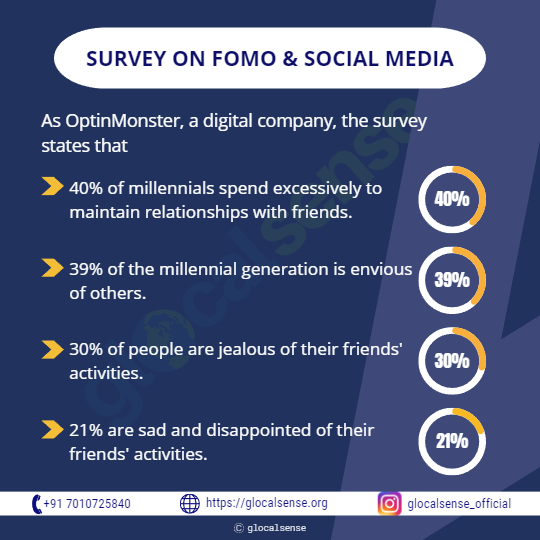Social media shows us how “perfect” our friends’ lives are. Sometimes we can’t help but compare our lives — which may or may not be as fruitful as theirs.
We may be warned by a nagging voice that we’re missing out on all the enjoyment. “Am I doing/living enough?” is a constant concern. But that inflames our compulsion to scroll through our highly-edited feeds every day, delving deeper into the online profiles we envy so that we don’t feel out of the loop in the end.

FOMO (Fear of Missing Out) persists as we become fixated on being in the spotlight. We might also forget about the world outside of social media. At the same time, JOMO could be the key to our happiness. Engage in JOMO (Joy of Missing Out) to give your mind some much-needed peace.
And the two have battled for what seems like an eternity in our social brains. Still, Facebook, Instagram, and TikTok have taken the conflict to a whole new level in recent history.

What is FOMO and JOMO?
FOMO is the compulsive need (often manifested as anxiety) to be constantly available, mentally or physically, to not miss out on exciting, significant events or moments. Corporate culture has also shed light on this widely used concept through which businesses attempt to engage their customers.
On the other hand, JOMO is the practice of drawing boundaries to enjoy every moment without being distracted by what everyone else is doing. It is choosing what brings us joy, making time for important things, and being intentional about how we spend our time. It is a social phenomenon caused by FOMO.
FOMO and Social Media
Interpersonal communication is the most effective type of communication. However, due to the Covid19 pandemic, the world has been forced to communicate through webcams.

People used social media to communicate during COVID-19 pandemic, which has increased social media usage by 40%. Because of the communication crisis, the increased use of digital platforms may cause symptoms of FOMO (FOMO). In addition, all the shared activities on social media are visible to everyone. These interactions may form bonds that impact people who actively socialize on social media, resulting in a desire to be constantly connected with other people’s activities. This is known as FOMO, which is a social anxiety syndrome characterized by a constant desire to be connected and understand what others are up to and is generally dominated by millennials.

As OptinMonster, a digital company, the survey states that 40% of millennials spend excessively and even go into debt to maintain interpersonal relationships with their friends. Furthermore, 39% of the millennial generation is envious. Their friends’ activities are more engaging than they do, 30% are jealous, and 21% are sad and disappointed.
Aside from the possibility of experiencing FOMO symptoms, millennials may also experience Joy of Missing Out signs (JOMO). According to Phelan, JOMO is a way of life that allows people to feel more relaxed and not worry about feeling missed out. In addition, humans require technology in their lives, but not as much as they believe, and JOMO is a method for balancing it.
This possibility is based on an interpersonal communication crisis caused by a long break in face-to-face communication. Many people spend time on themselves during the quarantine, which causes people to self-reflect and spend a lot of time with their families.
Why are we bothered by FOMO?
Many people’s use of social media is driven by FOMO, which interferes with our lives. People are held back from making real-life progress by their desire to do everything and be everywhere. It can also lead to physical issues such as fatigue, stress, and sleep disturbance.
The desire to stay socially connected can lead to social media addiction, as social media controls the whole social connectedness landscape. Social media has long been our shared language with one another, even before the social distancing and lockdown regulations.

On the other hand, FOMO has a significant impact on seeing the world. Excessive ruminating on our friends’ humorous exploits can intensify feelings of isolation, jealousy, failure, and inadequacy. All stem from the belief that our lives do not measure up.
Our intuition may lead us to believe that social media is the source of FOMO. However, this is not the case. According to a Google study, persons with unmet psychological needs and lower levels of life satisfaction are more prone to FOMO. FOMO culture is also linked to doom scrolling and other online activities.

How to turn FOMO into JOMO
- Get rid of all Facebook and Instagram notifications from your phone.
- Stop reaching for your phone when you wake up; instead, turn off your alarm and ignore the pull of social media.
- Give your full attention to the physically present people with you; enjoy their presence and the fun you are having without feeling the need to brag about it to the world via beautifully filtered images and witty captions.
- Stop being envious when you see your friends enjoying themselves online. Be grateful that they have the opportunity to catch up in their busy lives and call them up and talk to them instead of wasting your time scrolling through Social media feeds that you have already seen.
It’s time to enjoy your own company instead of bombarding yourself with images of the grass appearing to be greener on the other side of the social media fence. So put the phone down and take a look around you. There’s a lot more to consider than a status update.

Eight ways to convert from FOMO to JOMO
Below are eight simple tricks to help you overcome FOMO (Fear of Missing Out).
- Slow Down Your Mind
It works, no matter how clichéd it sounds. The absence of this can lead to FOMO. Be fully present, slow down your mind, and enjoy the action. If you’re going to eat, EAT; if you’re going to walk, WALK. Try to refocus your mind on what you already have or are already doing.
- Accept the Joy of Missing Out (JOMO)
You will be happier and more focused if you start focusing on your NEEDS rather than your WANTS. Needs are finite, whereas desires are limitless. Our desires drive us into frantic cycles of obsessing over things we have or may lose. Be more accepting of the fact that you cannot have it all. To achieve one goal, you must let go of another.
- Stop Making Comparisons to Others
People who suffer from FOMO are always under the impression that the grass is greener on the other side. As a result, they frequently compare their lives and accomplishments to those of others. Looking at other people’s lives all the time can nurture envy, which can lead to resentment. Instead, recognize and capitalize on the currently available opportunities in your life.
- Control Your Addiction to Social Media
When you understand the difference between reality and illusion, you will realize that everything on social media is a façade. There are many aspects to what you DON’T see, and only those are real. Therefore, it is essential to limit your social media consumption. Make sure you only use social media for a few minutes of entertainment.
- Meditation should be practiced
Meditation is one of the most popular methods for controlling what our minds think and do. Try short meditation sessions if you are constantly tempted to observe what others are doing. Meditation is a sure-fire way to keep your mind in the present moment. When you embrace the present moment, you can avoid the temptation to the area of approximately how life could have been or could be.
- Stop Worrying About Money
You will be happier and more satisfied if you focus more on the quality of people in your life and work harder to keep them there. Spend money on things that will bring you more abundance, such as investing in your business, continuing your education, or purchasing tools to help you grow and develop. You develop a better relationship with money and wealth. You will be rewarded tenfold when you use the money to become a better version of yourself.
- Maintain Your Relationships
Remember that only the trees that receive the most water thrive. Make sure to water the trees that will provide you with the most delicious fruits in the future. One such fruit-bearing tree is a relationship. Make an effort to nurture your relationships and devote more time and energy to those important to you.
- When assistance is required, request it
The entire procedure described above is far from simple. It will be similar to attempting to overcome a substance addiction. It will be one step at a time. You can make mistakes; if you do, go back to step one and start over. Enjoy the process and watch how your life begins to take shape. Last but not the least, don’t be afraid to seek assistance.
People in your life must be eager to assist you in breaking free from the grip of FOMO. When needed, seek help from friends, family, or a professional.
From FOMO to JOMO: How the World Is Improving Post-COVID
The JOMO concept is so popular that Google has created a Digital Wellbeing app that breaks down device usage metrics, putting JOMO in your hand. Because of COVID, this has all happened. Or, more specifically, the working from home mandated by COVID, which resulted in a significant reduction in non-productive routine time.
Non-productive routine time is anything that occurs outside of work or personal time but is a necessary component of those things. There was a lot of non-productive routine time in the pre-COVID world. However, we are getting more work and personal time now that we have eliminated the routines that don’t add value to anyone. And now it’s time for some introspection and JOMO!
Final Thoughts
People in the digital world experience FOMO and JOMO due to the basic needs for interpersonal communication. The only cause stems from the need for affection, which is one of the three needs (inclusion, control, and respect). Therefore, some people are FOMO, while others are JOMO. Still, they both have the same kind of affection with different responses.
While social media can exacerbate your FOMO, it is not entirely evil. When used in moderation, it can also help you stay happy. So, do not scroll to compare yourself to others or see how and what others are doing. Instead, use it to organize in-person gatherings and connect with friends who live far away.
If you feel the claws of FOMO gripping you, remember that it is your life that you are missing out on. As a result, practice mindfulness, gratitude, and acceptance of yourself.
